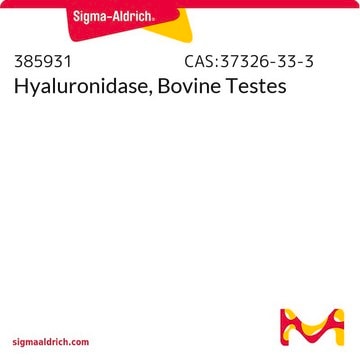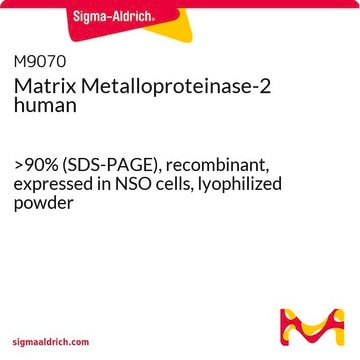H6254
Hyaluronidase from sheep testes
Type V, lyophilized powder, ≥1,500 units/mg solid
Synonym(s):
Hyaluronate 4-glycanohydrolase, Hyaluronoglucosaminidase
About This Item
Recommended Products
biological source
sheep testis
Quality Level
type
Type V
form
lyophilized powder
specific activity
≥1,500 units/mg solid
mol wt
55 kDa
application(s)
diagnostic assay manufacturing
storage temp.
−20°C
Looking for similar products? Visit Product Comparison Guide
General description
Application
- as a component of enzyme mix for the isolation of sertoli and germ cells from seminiferous tubules
- in the pre-treatment of deparaffinized adenomas sections for immunohistochemistry
- in the digestion of umbilical cord blood vessel for the generation of umbilical cord stromal stem cell lines
Biochem/physiol Actions
Unit Definition
Other Notes
Signal Word
Danger
Hazard Statements
Precautionary Statements
Hazard Classifications
Resp. Sens. 1
Storage Class Code
11 - Combustible Solids
WGK
WGK 3
Flash Point(F)
Not applicable
Flash Point(C)
Not applicable
Personal Protective Equipment
Certificates of Analysis (COA)
Search for Certificates of Analysis (COA) by entering the products Lot/Batch Number. Lot and Batch Numbers can be found on a product’s label following the words ‘Lot’ or ‘Batch’.
Already Own This Product?
Find documentation for the products that you have recently purchased in the Document Library.
Customers Also Viewed
Articles
Glycosaminoglycans are large linear polysaccharides constructed of repeating disaccharide units.
Glycosaminoglycans are large linear polysaccharides constructed of repeating disaccharide units.
Glycosaminoglycans are large linear polysaccharides constructed of repeating disaccharide units.
Glycosaminoglycans are large linear polysaccharides constructed of repeating disaccharide units.
Protocols
To measure hyaluronidase activity, a turbidimetric determination assay is used at 600 nm. One unit of hyaluronidase activity will cause a change in absorbance of 0.330 per minute at pH 5.35 at 37 °C.
To measure hyaluronidase activity, a turbidimetric determination assay is used at 600 nm. One unit of hyaluronidase activity will cause a change in absorbance of 0.330 per minute at pH 5.35 at 37 °C.
To measure hyaluronidase activity, a turbidimetric determination assay is used at 600 nm. One unit of hyaluronidase activity will cause a change in absorbance of 0.330 per minute at pH 5.35 at 37 °C.
To measure hyaluronidase activity, a turbidimetric determination assay is used at 600 nm. One unit of hyaluronidase activity will cause a change in absorbance of 0.330 per minute at pH 5.35 at 37 °C.
Our team of scientists has experience in all areas of research including Life Science, Material Science, Chemical Synthesis, Chromatography, Analytical and many others.
Contact Technical Service







